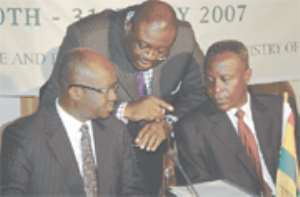
The Minister of Finance and Economic Planning, Mr Kwadwo Baah-Wiredu, has reiterated that the government recognises the negative effect the current power rationing exercise has on economic growth and will, therefore, explore further financial avenues to increase the country's generation capacity in the long term.
“In the short term, I can assure you that Ghana is on track in ensuring that we increase our power generating capacity to end the current energy crisis by the end of the year,” he said.
Mr Baah-Wiredu said this in Accra yesterday when he jointly launched an international conference on energy, scheduled to take place in Ghana from May 30 to 31, 2007, with the Minister of Energy, Mr Joseph Kofi Adda.
The conference, which will be attended by African Finance and Energy Ministers, will be used to look at feasible and sustainable financing options in meeting Africa's financing challenges in the energy sector.
The high-level conference, code-named Financing for Development, will be held on the theme, “Infrastructure for Growth, the Energy Challenge”.
Although Africa abounds in energy resources, many countries have not been able to create the conducive environment needed to attract investment in the development of the energy sector.
It is against this background that access to sustainable energy has become a key factor for promoting social progress and economic growth, both of which are linked to sustainable poverty reduction.
Mr Baah-Wiredu said it was a good sign that as the country went through the current energy crisis, the whole of Africa and its development partners were coming to Ghana to deliberate on ways to finance sustainable energy on the continent in order to meet the Millennium Development Goals (MDGs).
“The energy crisis cuts across Africa and we all believe that working at the national and international level, we will be able to fashion out medium to long-term solutions to the problem,” he observed.
He stated that since Africa would not be able to meet the MDGs, there was the need for the adoption of a new approach and the conference would, therefore, come out with sustainable approaches to improving energy access, as well as complementary financing options, including private-public partnership.
For his part, Mr Adda said it was estimated that Ghana required about $4.5 billion in the short to medium term to meet the infrastructural development requirements for the reliable and efficient production and supply of energy.
He explained that ensuring the reliable supply of affordable energy production meant consolidating, rehabilitating and expanding energy production and supply infrastructure to adequately provide for national demand.
Mr Adda said the medium-term strategic goal for the energy sector was to fix, within the next five years, the difficulties in the sector, particularly infrastructural development, institutional reforms and regulatory lapses.
The minister reiterated that since the government alone could not provide all the investment required to put in place the needed infrastructure to meet the demand, its policy now was directed towards independent power producers (IPP).
“It is envisaged that partnership with the private sector to intensify access to energy will lead to sustainable development, both in the urban and rural areas,” he said.
He stated, however, that while looking at the capitalisation and investment in the energy sector, alternative sources of renewable energy, such as solar, wind, biomass and biodiesel, were being encouraged to diversify the energy supply mix.
Mr Adda said it was comforting that the conference would be held at a time when Ghana was facing energy crisis, adding that that would “afford us the opportunity for cross fertilisation of strategies to combat energy deficiency in Ghana and across Africa”.
The Financing for Development conference came about when it dawned on both African countries and their development partners that Africa was unlikely to meet the MDGs unless aid was increased substantially.
Though the development partners responded through unprecedented aid commitments, aid inflow had been slow and so the financing and development meetings emerged to give the development partners and African countries a platform to come up with concrete steps in converting those aid commitments into development outcomes.
Story by Emmanuel Adu-Gyamerah




 Dumsor must stop vigil part 2: We’ll choose how we demonstrate and who to partne...
Dumsor must stop vigil part 2: We’ll choose how we demonstrate and who to partne...
 2024 elections: NDC stands on the side of morality, truth; NPP isn't an option —...
2024 elections: NDC stands on the side of morality, truth; NPP isn't an option —...
 Akufo-Addo has moved Ghana from 'Beyond Aid' to ‘Beyond Borrowing’ — Haruna Idri...
Akufo-Addo has moved Ghana from 'Beyond Aid' to ‘Beyond Borrowing’ — Haruna Idri...
 Train crash: NDC is full of evil mindset; driver who 'deliberately' parked the c...
Train crash: NDC is full of evil mindset; driver who 'deliberately' parked the c...
 Dumsor: Energy Minister must be fired; it’s becoming unbearable — IES
Dumsor: Energy Minister must be fired; it’s becoming unbearable — IES
 #DUMSORMUSTSTOP: IMANI responds to Yvonne Nelson's call for a joint vigil
#DUMSORMUSTSTOP: IMANI responds to Yvonne Nelson's call for a joint vigil
 'Obiara b3didi' — Manhyia South NPP Chairman fights for resourcing of NPP grassr...
'Obiara b3didi' — Manhyia South NPP Chairman fights for resourcing of NPP grassr...
 Dumsor: This thing is becoming unbecoming, collapsing our business — Nana Ofori ...
Dumsor: This thing is becoming unbecoming, collapsing our business — Nana Ofori ...
 Dumsor: It'll be no more by the end of April — Gideon Boako assure Ghanaians
Dumsor: It'll be no more by the end of April — Gideon Boako assure Ghanaians
 "I can now see clearly with my two eyes, thanks to the generosity of Afenyo-Mark...
"I can now see clearly with my two eyes, thanks to the generosity of Afenyo-Mark...
